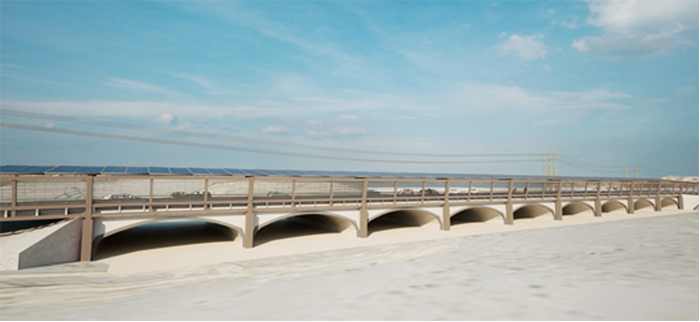California Transportation Commission staff recommended fifteen projects to receive $309.2 million from the Local Transportation Climate Adaptation Program (LTCAP). The program was created in 2022 in response to concerns about the vulnerability of transportation to climate hazards including sea level rise, flooding, fire, and the like. The money comes from California - $148 million, allocated under S.B. 198 - and the federal PROTECT formula program established under IIJA. That program, Promoting Resilient Operations for Transformative, Efficient, and Cost-Saving Transportation (PROTECT), provides another $252.4 million over five years.
The program is competitive, and projects that submit applications are graded on the basis of consistency with state, regional, and local climate adaptation plans, how well they incorporate environmental equity and the quality of public outreach, how much risk of damage or failure the projects are aiming to reduce, and other benefits they bring in terms of mobility, economy, goods movement, and safety.
The press release offers details about three of the projects:
- $50 million for two "all-weather" bridges on Indian Canyon Road, in the Coachella Valley, an area that experiences flooding and subsequent silt/sandstorms when the landscape dries out. "These improvements will increase the resiliency of local disadvantaged communities by increasing their access to key destinations that are critical to their livelihood and well-being," says the release. "The project also includes improvements to make walking and bicycling safer along the route."
- $33 million for a new road as a "second emergency evacuation route" out of the town of Paradise, which suffered a devastating fire five years ago. Paradise only had one way in and out of town, one reason so many people got caught in the flames. Today, many survivors remain displaced, and are unable to move back home, though not for lack of a second access road.
- $12 million to "help develop solutions to ongoing climate-related service suspensions along seven miles of the LOSSAN Rail Corridor between the cities of San Clemente and Dana Point," where crumbling cliffs have several times brought a halt to train service.
Another recommended project is the "Resilient SR 37 Sears Point to Mare Island Improvement," sponsored by the Metropolitan Transportation Commission. It's not clear what this $50 million grant would cover, exactly. As currently planned, the project would widen State Route 37, which crosses the top of the San Pablo Bay west of Vallejo. It would also toll it as a way to control traffic, but without a clear plan for offering transit alternatives. At some undefined point in the future, MTC and Caltrans plan to raise Highway 37 above its current level, since it is already subject to flooding and all indications are that will only get worse. However it's not clear whether this LTCAP funding is for that part.
The rest of recommended projects are listed on the CTC's website, but there is little detail beyond the name of the project, its location, and how much money is being recommended.






